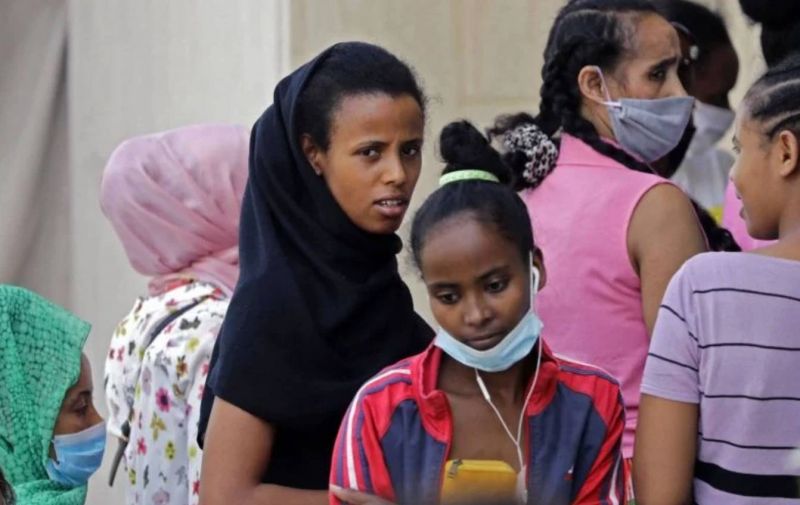
Domestic workers wait in front of the Ethiopian consulate to register for repatriation, Hazmiyeh, May 18, 2020. (Credit: AFP archive photo)
“You never get used to it... We’re all scared,” said Delphine nervously. Having arrived in Lebanon from Côte d’Ivoire 31 years ago, Delphine works at a house in an affluent Beirut district and waits, like millions of Lebanese, to see how things unfold as clashes along the southern border continue to intensify.
Over 250,000 women like Delphine, from countries that include the Philippines, Ethiopia, Sri Lanka, Nepal and Madagascar, worked full-time in Lebanese households as the crisis was in full swing back in 2019, according to the International Organization for Migration (IOM).
“But due to departures following the economic crisis and the Aug. 4, 2020 Beirut port explosion, this number decreased: the latest figures show that 180,000 workers are present in Lebanon,” said a representative of the Anti-Racism Movement, a Lebanese grassroots rights collective.
Delphine, who co-founded the Alliance of Migrant Domestic Workers in Lebanon, is especially worried about her colleagues in South Lebanon. “From early in the morning until late at night, I receive messages from girls telling me that they are afraid and asking me what to do. Some of them don’t speak Arabic and don’t communicate much with their employers, which reinforces their fears,” she said.
Sali, an Ivorian who works for a family in Nabatieh, shared her account with L’Orient-Le Jour. “the bombings on Tuesday evening [Oct. 24] were probably the heaviest since tensions began. The house shook and the windows almost shattered! The fear is there, but for the moment, the children still have school classes, so we’re staying. We’ve got our things ready, and if the situation gets any worse, we’ll all be leaving for Côte d'Ivoire,” she said.
The 2006 war
For many, the main fear a replay of summer 2006. “When the war broke out, some employers left their homes to flee the country, leaving behind frightened domestic workers. Some were left to fend for themselves in deserted flats, while others were hastily left in front of disorganized embassies, without papers or pay,” said Delphine.
Temesgen Oumer, the consul general of Ethiopia in Beirut, also dreads this scenario. “Around 10,000 women are currently working in the south of the country, and some employers are already abandoning our women in the suburbs of Beirut before we take charge of them and place them in hostels,” he told L’Orient-Le Jour.
Asked about the possibility of repatriation, Oumer said “for the moment, domestic workers did not make any demand in this regard, although a list has been opened to identify those who would be interested in leaving.”
Honorary Consul of Madagascar in Lebanon Mouhamad El Jouzou agreed. “Back in 2020, we made a major effort to repatriate our female nationals, but only 54 signed up and several dozen of them subsequently withdrew.”
On Oct. 23, the Philippine Embassy contacted its nationals in Lebanon by phone and messages posted online. The embassies of Ethiopia, Madagascar, Nepal, Sri Lanka and Côte d'Ivoire quickly followed suit. Embassies have also set up lists to register would-be returnees (at their own expense), to facilitate the return of those who wish to leave.
Even with organization and warnings, things remain uncertain. In 2006, faced with the failed response of embassies, it was the UN International Organization for Migration (IOM) that evacuated domestic workers, through the overland route via Syria.
But Anti-Racism Movement warned that even “this possibility, which is already very delicate, is threatened by the current events.”
“ Damascus airport has already been targeted since Oct. 7, which makes this alternative very uncertain,” he explained.
‘Kafala’
The decision to leave Lebanon is not a trivial one, especially in the long term. “If I go to the Philippine Embassy to leave voluntarily, then I won’t be able to come back and work here. I can’t afford that,” said Myriam, a member of the Alliance of Migrant Domestic Workers in Lebanon.
For the overwhelming majority of these women, their jobs in Lebanon are their only way to ensure a decent life for their families back home.
The kafala system, which has been criticized by rights organizations for decades, opens the door to all sorts of abuses, including the withholding of worker’s passports..
“Kafala ties the employee so closely to her sponsor that she is not guaranteed the right to decide for herself whether to leave or stay. The sponsor’s direct permission is essential,” explained Anti-Racism Movement.
While Delphine said she is privileged to have worked for 29 years in Beirut for a “Madam” whom she described as attentive and generous, she admitted there was another reason she was staying. “Even if the Lebanese don’t consider us as their own, I consider myself to be from here. When I go back to Abidjan, I’ll feel like I’m abandoning a big part of me. And then, if Lebanon were a human being, we’d say that it really doesn’t have an easy life... so I want to stay by its side.”
This article was originally published in French in L'Orient-Le Jour. Translation by Joelle El Khoury.